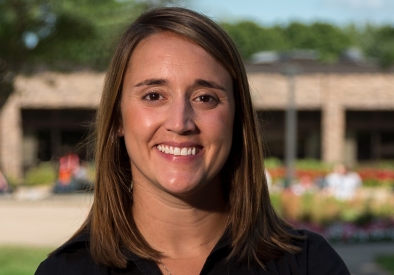
NIH Family Members Giving Back: Rebecca Shlafer

Rebecca Shlafer/Credit: Brady Willette
When Rebecca Shlafer clicks on her office lights each morning at the University of Minnesota Medical Center, Minneapolis, she usually has a good idea of what to expect from the day ahead as lead of a nine-person research team that studies the effects of incarceration on children and families. It’s her volunteer work that can be unpredictable.
For the past eight years, this developmental child psychologist has donated her free time to serve as a guardian ad litem for abused or neglected children who’ve been removed from their homes and placed under protective supervision of Minnesota’s Fourth Judicial District. In that volunteer capacity, Shlafer advocates in court for the well-being of the child, but doesn’t foster the youngster or provide any day-to-day care.
Shlafer, who recently completed a training grant with NIH’s National Center for Advancing Translational Sciences, first got into volunteering as a graduate student, when she signed up to deliver warm meals to the hungry throughout the Twin Cities area. While completing her Ph.D., she heard about the Hennepin County Guardian ad Litem Program and thought it would be a great fit to use her degree as a community volunteer. Shlafer completed a mandatory 10-week training course, then took on her first case in 2009.
Since then, she’s advocated on behalf of more than 20 abused or neglected kids and estimates she’s donated a total of 750 hours—and counting. As a guardian ad litem, Shlafer thinks holistically about each child, “putting on my Mom hat” to assess his or her needs, be it physical, psychological, or emotional. Shlafer then makes recommendations about how the youngster’s needs might be met, and pushes the court system, as well as she can, to turn those recommendations into reality.
For example, Shlafer recently worked with a teenager who hadn’t had a physical examination in years. Working through the courts, Shlafer helped the teenager get caught up on a number of exams and start conversations about her reproductive health.
Serving as a volunteer guardian ad litem has provided Shlafer with a unique window into the real-world problems that her research team is attempting to solve. It’s also impressed upon her the importance of her research to help children. Shlafer, for instance, sometimes realizes that certain aspects of child trauma or abuse relevant to the case have been poorly studied, leaving the court with a limited evidence base to formulate its decisions.
The experience has also taught Shlafer that things often don’t run as smoothly in the legal system as they do in the research lab. She often has to adjust her schedule to meet with the child and people relevant to the case, as well as to accommodate changes and delays in court proceedings. But that’s okay with Shlafer. As difficult and emotionally challenging as her volunteer work can be at times, Shlafer says it’s incredibly rewarding when she helps children to get the assistance they need to thrive.
Shlafer offers two pieces of advice to anyone interested in pursuing volunteer work. One, set personal priorities. If helping kids in your community resonates with you, make it a priority in your life. Two, set boundaries. For example, Shlafer accepts just one case at a time, saying she can’t do a good job for children if she’s spread too thin and unable to strike the right balance between home, work, and volunteering.
Links:
What is a Guardian Ad Litem? (Education for Justice, St. Paul, MN)
Rebecca Shlafer (University of Minnesota, Minneapolis)
Video: Why Rebecca Shlafer Does What She Does (University of Minnesota Health)






















.png)











No hay comentarios:
Publicar un comentario